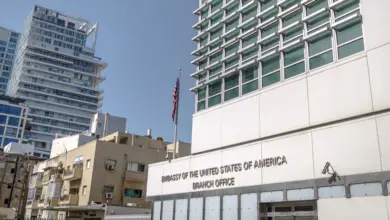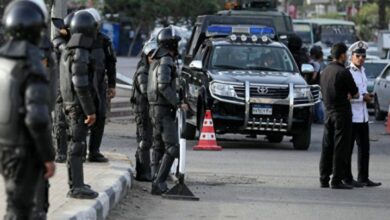Human rights lawyers and defendants were outraged by the Emergency State Security Court's ruling Sunday sentencing 74 suspects to a suspended prison sentence of one year for attacking the Israeli and Saudi embassies. They described it as a "political, unjust" verdict.
"Many of these suspects are innocent, but the rulings of the emergency courts are always politically motivated and they deprive suspects of their basic right to appeal the verdict," Gamal Eid, director of the Arabic Network for Human Rights Information, told Egypt Independent Monday.
Mohamed Abdel Aziz, lawyer with the Front to Defend Egypt's Protesters and who represents the defendants, echoed Eid, saying the only way to get around the court's verdict is to file a grievance to the president.
The charges against the suspects include illegal gathering, damaging private and public property, assaulting diplomatic missions and police officers while on duty, and arson.
As the judge announced the verdict, he said the court took into consideration the circumstances the country was going through following the 25 January uprising, giving the defendants a suspended sentence, according to state news agency MENA.
He added that the court would pass down harsher sentences if the defendants committed the crimes again.
However, the judge's statement did little to ease the disgruntled defendants and their families.
"We are shocked by this verdict. It means that our children are guilty and they're thugs. Our children didn’t do anything to deserve this," Wafaa Abdel Aal, mother of defendant Ahmed Abdel Karim, told Egypt Independent.
Defendant Ramy Ibrahim, 26, said he was on his way from work when he was arrested in front of the Giza Security office for just passing by.
"I have an official document proving that I was at work in the laboratory when the attack started. I was on my way home when I was arrested; how can I be guilty?" Ibrahim asked.
Ragia Omran, a lawyer with the Front to Defend Egypt's Protesters who represents the defendants, explained that the verdict would go on the suspects' criminal records and if they're convicted again of the same charges within three years, they would have to serve the suspended year in prison in addition to their new sentence.
"This verdict wants to prevent us from ever participating in protests and will make us think twice before we even go down in the streets," Ibrahim said.
The suspects had already been imprisoned for over three months during investigations.
The fact that 74 suspects all received the same sentence raised a lot of eyebrows among legal experts, indicating its political nature.
The Emergency State Security Court, which gave the ruling in the case Sunday, was established under the infamous Emergency Law, which Egypt has been under since 1981.
On 31 May, the country's former interim ruler, the Supreme Council of the Armed Forces, announced the lifting of the state of emergency and "recommended" the transfer of all trials under the mandate of the Emergency State Security Court to regular civilian courts.
In June, Public Prosecutor Abdel Meguid Mahmoud ordered that all the cases that would have been tried by that court under the Emergency Law be referred to felony and misdemeanor courts.
"This included all the cases that the [Emergency State Security Court] hadn't started trying yet, but the Israeli Embassy case had already been on trial for months when the order was issued so it wasn't included in the prosecutor's announcement," Abdel Aziz said.
The attack on the embassies and the Giza Security office took place in September last year while Egypt was still under a state of emergency. The attacks left three dead and more than a thousand injured.
"We are against the [Emergency State Security Court], which was established to serve the now-disbanded state security apparatus that served only the president's best interests," Eid said.
On his part, Abdel Aziz speculated that the target of this verdict was retired Colonel Omar Afify, who was sentenced in absentia to five years in prison in the same case for inciting the people to attack security forces and using violence to sabotage public property through videos posted online.
"According to the law, you can't convict the inciter without convicting the actual perpetrators, so the judge had to hand down a sentence on the perpetrators as well," Abdel Aziz explained.
Afify is a former police colonel who posted a number of videos on YouTube prior to and after the 18-day revolt, advising protesters on how to maneuver, resist and overcome security forces during mass protests.
He had previously written a book titled "In Order Not to Be Beaten on the Back of Your Head," in which he gave instructions on how to avoid being tortured by the police. The book was censored and Afify later fled to the US. He has since criticized the Hosni Mubarak regime and the military council that took control after his ouster.
After the election of President Mohamed Morsy, Afify posted a video on 24 June, congratulating him and describing his election as a "victory for Egypt's revolution." He called on Morsy to release all those detained during the revolt and to drop any charges against them.




